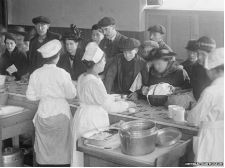On This Day
On This Day, 19 October 1917
On 19, Oct 2017 | In On This Day | By Nicola Gauld
Birmingham Mail
Friday 19 October 1917
COMMUNAL KITCHENS.
AN INCONCLUSIVE BIRMINGHAM EXPERIMENT.
Six months or so ago Birmingham ventured on the experiment of a communal kitchen, setting up such an establishment in Windsor Street. It was opened under auspicious circumstances, and while the experiment has not been a failure, it has admittedly not been as successful as was anticipated. The number of dinners provided daily exceeds 100, and to a number of families, especially those engaged in munition factories, the kitchen is, and has been, a boon. The appeal has not, however, been far-reaching, and among those closely interested in the establishment of such kitchens the view is held that the district chosen, although poor and congested, is not the best one for such an experiment. Others insist, however, that the kitchen has not been sufficiently long in operation to justify the comment that it has failed to succeeded, and that this should be reserved until fuller experience, such as may be obtained during the forthcoming winter, has been gained. A second kitchen, established by Mrs. Willink, wife of the rector of Birmingham, with the assistance of a committee, is in operation near Dean Street.
In an interview this morning the Lord Mayor pointed out that the authorisation by the Council of a grant of £1,000 to the Food Committee for Communal Kitchens must not be taken to mean that the latter was now definitely committed to the establishment of more communal kitchens. The question must be decided by the extent of public requirements, and if a further kitchen or kitchens were opened, then the greatest care would have to be exercised to see that their location was in the right districts. The fact that the Windsor Street kitchen had not been as successful as had been hoped was, of course, an argument against any development of the movement. The Food Committee must profit by experience. There was no doubt that such kitchens could be of great service to the families of women who were engaged during the day in munition factories, in the provision of good wholesome food at a small cost. Moreover, communal kitchens achieved another important result in severe economy in labour and in the use of fuel and other material.
It is understood that the cost of these kitchens will be borne by the authorities in London, and the amount allocated by the City Council is merely to cover such expenditure pending settlement by the central body.



